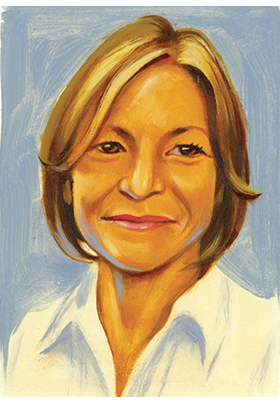Editor’s Note: For our annual de-risking issue, we asked Robin Diamonte—CIO of United Technologies (UTC) and the most influential American corporate plan representative on our Power 100—to be our guest editor. As part of that arrangement, Robin advised us on what topics were essential (including longevity), and chuckled at our cover story premise (Managing Editor Leanna Orr trying to LDI her life). We also asked Robin to pen a letter about what keeps her up at night as a CIO.
 Art by Chris BuzelliThere is one
nagging question: What can or should I be doing to be successful at my job?
Art by Chris BuzelliThere is one
nagging question: What can or should I be doing to be successful at my job?
The counterintuitive truth is that ‘success’ in this context is eventually working myself out of a job by putting the defined benefit plan into hibernation—immunizing the plan’s liabilities with matching assets at a low cost to the company.
I joined UTC in December 2004, when losses from the tech bubble bust were peaking and would subsequently roll out of the pension expense calculation and earnings per share. Since then, the company has contributed $8 billion dollars globally into the plans. Our annualized return has been 8.5%, above our target expected return on pension assets and 1% above our policy benchmark. Despite this, we only saw full funding briefly at the end of 2007. We again came close to full funding at the end of 2013—but geopolitical stability deteriorated, global growth weakened, commodity prices tanked, China slowed, treasury yields fell again, and the Society of Actuaries figured out that people were living longer.
The CIO job has substantially changed over the last decade. We are no longer just investors trying to recommend the optimal strategic policy, hire managers that beat benchmarks, and outperform our peers. We now are accountants, actuaries, risk managers, and experts in longevity trends and regulatory issues. We follow treasury yields, corporate spreads, and the discount rate daily, instead of annually.
Going forward, my biggest worries are slower global growth, global deflation, and an extended period of low returns. This is the perfect storm scenario for inflating liabilities and shrinking assets.
Over the last several decades, we have added many investment tools to our tool kit: hedge funds of every type, portable alpha, risk parity, smart beta, and liquid alternatives, just to name a few. Are these strategies and new ones yet to be invented (or re-packaged) going to give us the return we need in the future? Can we achieve growth without volatility? And if successful at that point, will we have the right liability-driven investing strategy and enough corporate bonds in the marketplace to effectively immunize the plan?
I surveyed 15 of my CIO colleagues, asking them the same nagging question. Not surprisingly, many noted similar concerns but also listed others such as black swan events, hedge fund or private equity fraud, high valuations, equity risk, lack of company cash for funding, and liquidity worries. Five of them even mentioned difficultly in attracting and retaining good talent. One asked, “When will pension investing stop being fun? Once we’re done freezing our plans, shifting assets to (boring) bonds, and spinning off all the liabilities we can—and our jobs no longer have the relevance they have now—what will be left?”
Personally that’s an easy answer for me. Retirement!
Robin Diamonte is CIO of United Technologies
